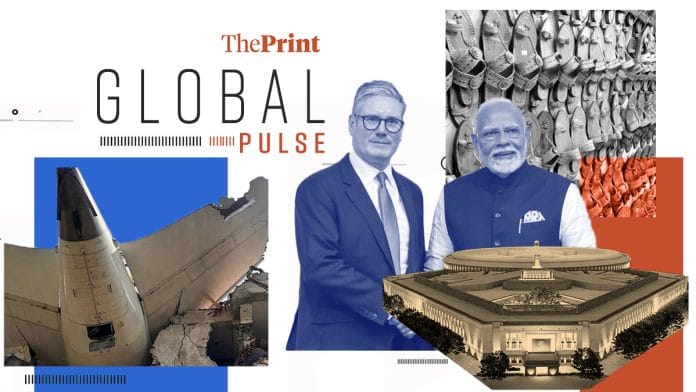New Delhi: In an opinion in Foreign Affairs titled ‘The Indian System Is Breaking Down’, Yamini Aiyar posits that centralisation is undermining federalism and national unity in India, referring to the tensions surrounding delimitation.
“The tensions surrounding delimitation extend far beyond the electoral realm—they speak to a broader fraying of Indian federalism,” it states.
“The widening socioeconomic gaps among states and the BJP’s ideological project are putting new pressures on the federal bargain on which India’s democracy is based. Without an appropriate resolution to these challenges, a more fractious federal politics will take hold in India, hindering economic progress and, more significant, curtailing hard-won democratic freedoms,” it adds.
An opinion by Janan Ganesh in Financial Times titled ‘The world is run by old men in a hurry’ looks at the world’s current predicament: never before in history have so many world leaders been hurtling towards old age. Although, Europe has by and large been immune to this trend.
France’s Emmanuel Macron and Italy’s Giorgia Meloni are prodigies while Prime Minister Narendra Modi finds himself among a list of “destabilising forces”—world leaders who are well into their 70s, according to the article.
“(China’s) Xi (Jinping) and Modi have been in place for over a decade each. When Ali Khamenei became Iran’s supreme leader, the Soviet Union still existed. (Israel’s Benjamin) Netanyahu, like (Brazil’s Luiz Inácio) Lula, is a retread. To some extent, these countries—or at least their states—are products of their current leaders. There are few eerier experiences than asking a western spy or diplomat how a post-Putin Russia might act in the world. What comes back is elegant guesswork, or a shrug,” it adds.
Financial Times also looks into the trade deal agreed upon by Modi and his British counterpart Keir Starmer, through which tariffs on more than 90 percent of UK exports to India will be cut. The move is set to “eventually benefit the UK economy by 4.8 billion pounds a year”, states the report by Jim Pickard and John Reed.
“India will benefit from the elimination of tariffs on about half of its exports to the UK, including textiles, footwear and agricultural produce such as mangoes and grapes. Most of those were already low at typically 4 per cent to 16 per cent,” it says, adding that India has also agreed to a “historic” cut in automobile imports.
Families of two British citizens who lost their lives in the Ahmedabad Air India plane crash, have received “remains of other people”—a “commingling of genetic material”, reports Jonathan Wolfe in The New York Times.
“This has added an indescribable psychological distress to families who are already going through the trauma of losing a loved one,” their lawyer, James Healy Pratt, is quoted as saying.
“While Britain sent forensic specialists to advise British families in India after the crash, the process of DNA identification and the placement of remains in the caskets was handled by the Indian authorities, a spokeswoman for Britain’s National Police Chiefs’ Council said in an email,” according to the report.
The Guardian reports that the India-UK trade deal marks the culmination of three-and-a-half years of negotiations, and the British labour government has “defied expectations”.
After Piyush Goyal, who led the negotiations for India, told British officials he was a fan of the show Yes Minister, British negotiators brought him a handwritten note from Jonathan Lynn, one of the show’s co-creators, writes Eleni Courea.
“Negotiating with India is not the same as negotiating, say, with Australia, or the USA, or Canada. It’s a relationship-based system, very much about who gets on with who and ensuring that you don’t insult anyone in any way,” said a senior UK official involved in talks, according to the report.
“There were moments of comedy. At one point after a difficult set of negotiations, UK and Indian officials let off steam by doing yoga in the corridor outside the room,” it says.
According to Bloomberg, the Prada-Kolhapuri fracas serves as proof of the power brandished by the Indian troll army.
“The saga underscores how much power the South Asian giant’s digital tribe holds, where online outrage regularly influences public debate—especially when citizens perceive their heritage is under attack. International firms eyeing one of the world’s fastest-growing markets should weigh the risks of these cultural missteps,” writes Karishma Vaswani.
(Edited by Nida Fatima Siddiqui)
Also Read: Air India gives all clear to its Boeing fuel switches & India-Pakistan ‘ritual’ standoff at Wagah






